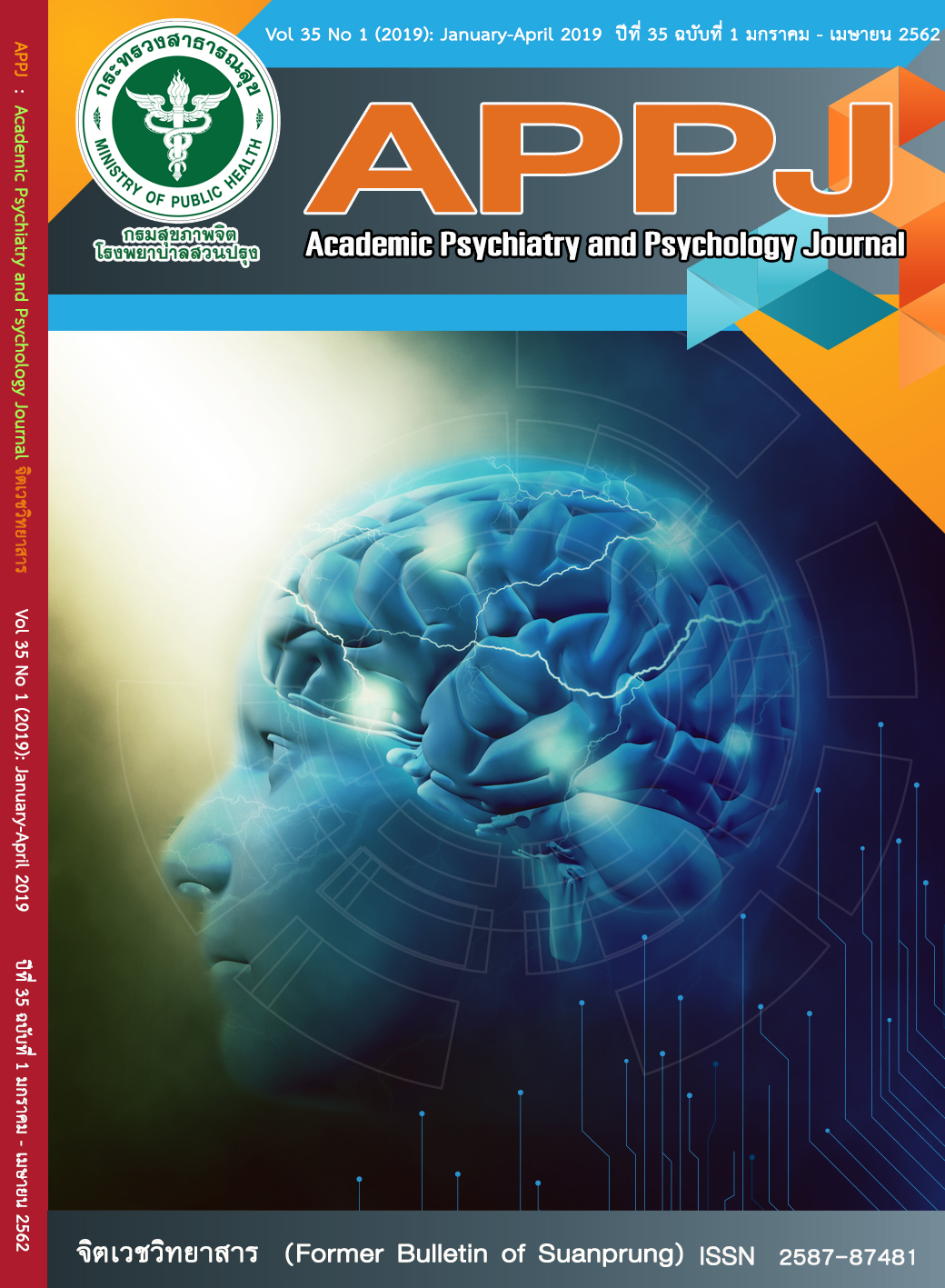Psychological Experiences of Adolescents with Secure Attachment Style in High Conflict Families
Main Article Content
Abstract
Psychological Experiences of Adolescents with Secure Attachment Style
in High Conflict Families
ABSTRACT
Objective:This qualitative research proposed to study the psychological experiences of adolescents with secure attachment style in high conflict families.
Method: Key informants were eight undergraduate students with secure attachment style who also reported their perception of high interparental conflict. Interpretative Phenomenological Analysis (IPA) method was employed in this research.
Results: Data analysis resulted in 3 themes: (1) The pattern of the interparental conflict which included topics that caused the conflicts, parents’ reaction to the conflict, and reconciliation of parents. (2) Adolescent’s reaction towards interparental conflicts which consisted of adolescent’s management towards the conflict, adolescent’s feeling regarding the conflict, and lesson learned from the conflict. (3) Having secure resources including supportive environments and internal resources that facilitate psychological stability.
Conclusion : Key informants had external and internal factors that facilitate their psychological security to deal with families conflict and relationship with others.
Keywords : Psychological experiences, Attachment, Adolescent, Family conflict
ประสบการณ์ทางจิตใจของวัยรุ่นที่มีรูปแบบความผูกพันแบบมั่นคงและภูมิหลังครอบครัวขัดแย้งสูง
บทคัดย่อ
วัตถุประสงค์ : เพื่อศึกษาประสบการณ์ทางจิตใจของวัยรุ่นที่มีรูปแบบความผูกพันแบบมั่นคงและภูมิหลังครอบครัวขัดแย้งสูง
วิธีการ : เป็นการศึกษาประสบการณ์เชิงลึกของผู้ให้ข้อมูล จำนวน 8 ราย มีอายุตั้งแต่ 18-22 ปี ที่รายงานว่าตนมีรูปแบบความผูกพันแบบมั่นคงและมีการรับรู้ความขัดแย้งระหว่างผู้ปกครองสูงจากแบบสอบถาม มีการเก็บข้อมูลโดยการสัมภาษณ์เชิงลึกรายบุคคลแบบกึ่งโครงสร้าง ตามวิธีการวิจัยเชิงคุณภาพแนวปรากฏการณ์วิทยาเชิงตีความ
ผล : ประสบการณ์ทางจิตใจมี 3 ประเด็นหลัก ดังนี้ (1) รูปแบบของความขัดแย้งระหว่างพ่อแม่ที่ตนเผชิญ ได้แก่ สาเหตุความขัดแย้งของพ่อแม่ การแสดงออกของพ่อแม่ต่อความขัดแย้ง และการกลับมาเป็นปกติในความสัมพันธ์ของพ่อแม่ (2) ปฏิกิริยาของลูกที่มีต่อความขัดแย้งระหว่างพ่อแม่ ได้แก่ การรับมือของลูกต่อความขัดแย้งระหว่างพ่อแม่ ความรู้สึกที่เกิดขึ้นจากการรับรู้ความขัดแย้งระหว่างพ่อแม่ และสิ่งที่ลูกได้เรียนรู้จากความขัดแย้งระหว่างพ่อแม่ และ (3) การมีทรัพยากรที่เอื้อต่อการมีความมั่นคงทางจิตใจ ได้แก่ สิ่งแวดล้อมที่เกื้อกูล ทรัพยากรภายในตนที่เอื้อให้เกิดความมั่นคงทางจิตใจ
สรุป : ผู้ให้ข้อมูลมีทรัพยากรทั้งจากภายในและภายนอกตนที่เอื้อต่อความมั่นคงทางจิตใจในการเผชิญกับความขัดแย้งในครอบครัวและการปฏิสัมพันธ์กับผู้อื่น
คำสำคัญ : ประสบการณ์ทางจิตใจ, ความผูกพัน, วัยรุ่น, ครอบครัวขัดแย้ง
* บทความนี้เป็นส่วนหนึ่งของโครงงานวิจัยระดับปริญญามหาบัณฑิต สาขาจิตวิทยาการปรึกษา คณะจิตวิทยา จุฬาลงกรณ์มหาวิทยาลัย ผู้ที่สนใจบทความนี้กรุณาติดต่อ นายกิตติคุณ ซึ้งหฤทัย (kittikun.psycu@gmail.com)หรือ ผศ.ดร.ณัฐสุดา เต้พันธ์ (nattasuda.t@chula.ac.th)
Article Details
บทความหลังผ่านการปรับแก้จากกองบรรณาธิการแล้ว เป็นลิขสิทธ์ของวารสารจิตเวชวิทยาสาร โรงพยาบาลสวนปรุง กรมสุขภาพจิต กระทรวงสาธารณสุข ห้ามเผยแพร่เพื่อประโยชน์ทางการค้าโดยไม่ได้รับอนุญาต แต่อนุญาตให้เผยแพร่บทความดังกล่าวเพื่อประโยชน์ทางการศึกษาแก่ประชาชนทั่วไป ทั้งนี้กองบรรณาธิการไม่จำเป็นต้องเห็นด้วยกับบทความหรือข้อคิดเห็นใดๆ ที่ปรากฏในวารสารสวนปรุง
References
2. Neighbors BD, Forehand R, Bau J-J. Interparental conflict and relations with parents as predictors of young adult functioning. Dev Psychopathol. 1997;9(1):181.
3. Slater EJ, Haber JD. Adolescent adjustment following divorce as a function of familial conflict. J Consult Clin Psychol. 1984;52(5):920.
4. Rosenberg M. Society and the adolescent self-image. Princeton, NJ: University Press; 1965.
5. Kittikun S, Teppratan S, Supanat R. Relationships between perception of interparental conflict, coping strategies and life satisfaction. Bangkok: Chulalongkorn University; 2014. (in Thai)
6. Bahrassa NF, Syed M, Su J, Lee RM. Family conflict and academic performance of first-year Asian American undergraduates. Cultur Divers Ethnic Minor Psychol. 2011;17(4):418.
7. Baer PE, Garmezy LB, McLaughlin RJ, Pokorny AD, Wernick MJ. Stress, coping, family conflict, and adolescent alcohol use. J Behav Med. 1987;10(5):459.
8. Bowlby J. Attachment and loss: Retrospect and prospect. Am J Orthopsychiatry. 1982;52(4):669.
9. Goldner V, Penn P, Sheinberg M, Walker G. Love and violence: Gender paradoxes in volatile attachments. Fam Process. 1990;29(4):346.
10. Borst JB. A systematic review of the effects of family conflict: Focusing on divorce, infidelity, and attachment style. Master of Social Work Clinical Research Papers. 2015;5:426.
11. Lansford JE. Parental divorce and children's adjustment. Perspect Psychol Sci. 2009;4(2):149.
12. Ehrenberg M, Robertson M, Pringle J. Attachment style and marital commitment in the context of remarriage. J Divorce Remarriage. 2012;53(3):205.
13. Steinberg SJ, Davila J, Fincham F. Adolescent marital expectations and romantic experiences: Associations with perceptions about parental conflict and adolescent attachment security. J Youth Adolesc. 2006;35(3):344.
14. Peluso PE. Infidelity. New York: Routledge; 2007.
15. Kobak RR, Sceery A. Attachment in late adolescence: Working models, affect regulation, and representations of self and others. Child Dev. 1988;59(1):143.
16. Keelan PRJ, Dion KL, Dion KK. Attachment style and heterosexual relationships among young adults: A short-term panel study. J Soc Pers Relat. 1994;11(2):210.
17. Wongpakaran T, Wongpakaran N. A short version of the revised ‘experience of close relationships questionnaire’: Investigating non-clinical and clinical samples. Clin Pract Epidemiol Ment Health. 2012;8:38.
18. Smith JA. Interpretative phenomenological analysis. Journal of the Society for Existential Analysis. 2010;21(2):186.
19. Bowlby J. A secure base: Parent-child attachment and healthy human development. New York, NY, US: Basic Books; 1988.
20. Sullivan HS. Conceptions of modern psychiatry. Oxford, England: William Alanson White Psychiatric F; 1947.
21. Erikson EH. Identity: youth and crisis. New York: Norton; 1968.
22. Baumrind D. Effective parenting during the early adolescent transition. Family transitions. Advances in family research series. Hillsdale, NJ, US: Lawrence Erlbaum Associates; 1991.

